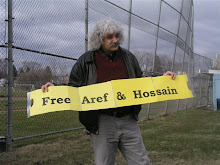I, along with a number of activists in the Albany area, have formed a socialist discussion group in which we read material and hold a discussion on the reading and issues of the day. One new member of our group e-mailed me and asked my opinion on democracy. He asked if there are any examples of democratic functioning states. He also suggested that it might be good to have a 4th branch of government comprised of scientist and other experts who might be better able to respond to climate change and similar issues. Below is my response to his e-mail.
Your e-mail brings up many questions. First of all, I don’t think that we need a panel of experts, such as scientists, as a 4th branch of government. I think that if people were given the facts, we can make decisions that are in our own interest and the interest of all. This is why there is secrecy in our country, they don’t want people to know the truth, it would expose too much. They don’t want people to see the pictures of torture or hear the facts about global warming, etc. Too often we are told that we are too stupid to make decisions for ourselves. This is one way they take democracy away from us; they tell us to leave it in the hands of the experts or the politicians.
I think there have been very few examples of a true democracy in the modern world. In fact, maybe you can’t have a true democracy in a class society because the ruling class, if it is a minority, as in this country, would not want to see its power taken away. On the other hand, if the working class truly took power, the only way we could rule would be democratically because we are the vast majority. There is actually a lot more to talk about here like what happened in the Soviet Union, etc., but that would better be discussed at another time because there is a long history about this.
Although there have been no real models of democracy in the modern world, there have been many attempts that give us a glimpse of what a true democracy might look like. The Paris Commune, where workers took over Paris and parts of France before being crushed by invading armies was one example. Some attempts in Cuba, Nicaragua and other places helped give us a glimpse of what democracy could look like. Basically, Marxist don’t typically equate voting and democracy, like we do in the US. Voting is part of democracy. But in most other industrial countries they have a better system of voting such as proportional representation, requirements for equal access to the media and less involvement of money. In the US, you have to be rich or supported by the rich to run for national office. This is a filter that insures the interests of the rich will be those represented by the government.
In some of the places mentioned above, they tried to organize people on a block by block level. In Cuba, these block committees were called Committees for the Defense of the Revolution. They discuss everything from health care and education in their communities to international politics. They then elect representatives to committees organized on a regional level who elect people to the national level. These are in addition to direct national elections. Additionally, they helped organize women’s organization, labor, farmers, youth and other constituency groups. These groups discuss issues related to their constituencies and also elect people to the regional and national governing bodies.
Additionally, Cuba included the right to have a union as a democratic right. The right to a job is also seen as a democratic right. There are many other areas, besides elections where equality needs to be seen as a democratic right.
I have a friend at work who comes from China. He and many others at our work had a big problem with one of our managers. But nothing could be done about it. Work in the US is a dictatorship. He told me in China, if the workers did not like a manager they would have a meeting and decide that the manager was not good and would be able to get rid of him. In the US, he says, you can criticize the president, which you can’t do in China, but you can not criticize your manager, which you can do in China. Perhaps, if we did not have a capitalist society where work means making a profit for the boss, we would be able to criticize our manager too.
So, I think that in a socialist society, democracy would mean something very different. Since we grew up in a capitalist society we think of it as being the same as voting. In the original US constitution, only white men who owned property could vote. Later, through amendments we allowed all adults citizens to vote. After an uprising the first amendment was added to the constitution which included other rights like the right to free speech and assembly, which we now call democratic rights, but were not there in the beginning. But in a socialist society, we may add the right to housing, healthcare, a job, the right for women to control their own bodies, the right for gays to marry, etc.
Also, in a non-hierarchical society the entire idea of democracy would be different and less adversarial.
So, that’s a longer answer to your e-mail than I intended, but much shorter than needed. Perhaps it would be a good topic to discuss at one of our meetings.
Joe Lombardo
Thursday, December 17, 2009
Subscribe to:
Comments (Atom)




